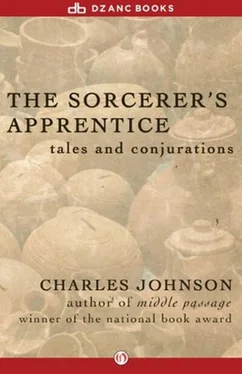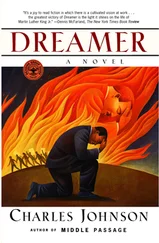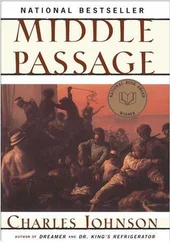“Allan’s here,” his father said to someone in the sitting room. “My son is a Conjure Doctor, you know.”
“I seen him,” said a girl’s voice. “Looks like he knows everything there is to know about magic.”
The house, full of heirlooms, had changed little since Allan’s last year with Rubin. The furniture was darkened by use. All the mirrors in his mother’s bedroom were still covered by cloth. His father left week-old dishes on the hob, footswept his cigars under the bare, loose floorboards, and paint on the front porch had begun to peel in large strips. There in the sitting room, Lizzie Harris sat on Beatrice’s old flat-bottomed roundabout. She was twice as big as Allan remembered her. Her loose dress and breast exposed as she fed her baby made, he supposed, the difference. Allan looked away while Lizzie drew her dress up, then reached into her bead purse for a shinplaster — Civil War currency — which she handed to him. “This is all you have?” He returned her money, pulled a milk stool beside her, and said, “Please, sit down.” His hands were trembling. He needed to hold something to hide the shaking. Allan squeezed both his knees. “Now,” he said, “what’s wrong with the child?”
“Pearl don’t eat,” said Lizzie. “She hasn’t touched food in two days, and the medicine Dr. Britton give her makes her spit. It’s a simple thing,” the girl assured him. “Make her eat.”
He lifted the baby off Lizzie’s lap, pulling the covering from her face. That she was beautiful made his hands shake even more. She kept her fists balled at her cheeks. Her eyes were light, bread-colored, but latticed by blood vessels. Allan said to his father, without facing him, “I think I need boiled Hound’s Tongue and Sage. They’re in my bag. Bring me the water from the herbs in a bowl.” He hoisted the baby higher on his right arm and, holding the spoon of cold cereal in his left hand, praying silently, began a litany of every spell he knew to disperse suffering and the afflictions of the spirit. From his memory, where techniques lay stacked like crates in a storage bin, Allan unleashed a salvo of incantations. His father, standing nearby with a discolored spoon and the bowl, held his breath so long Allan could hear flies gently beating against the lamp glass of the lantern. Allan, using the spoon like a horseshoe, slipped the potion between her lips. “Eat, Pearl,” the apprentice whispered. “Eat and live.” Pearl spit up on his shirt. Allan closed his eyes and repeated slowly every syllable of every word of every spell in his possession. And ever he pushed the spoon of cereal against the child’s teeth, ever she pushed it away, gagging, swinging her head, and wailing so Allan had to shout each word above her voice. He oozed sweat now. Wind changing direction outside shifted the pressure inside the room so suddenly that Allan’s stomach turned violently — it was if the farmhouse, snatched up a thousand feet, now hung in space. Pearl spit first clear fluids. Then blood. The apprentice attacked this mystery with a dazzling array of devices, analyzed it, looked at her with the critical, wrinkled brow of a philosopher, and mimed the Sorcerer so perfectly it seemed that Rubin, not Allan, worked magic in the room. But he was not Rubin Bailey. And the child suddenly stopped its struggle and relaxed in the apprentice’s arms.
Lizzie yelped, “Why ain’t Pearl crying?” He began repeating, futilely, his spells for the fifth time. Lizzie snatched his arm with such strength her fingers left blue spots on his skin. “That’s enough!” she said. “You give her to me!”
“There’s another way,” Allan said, “another charm I’ve seen.” But Lizzie Harris had reached the door. She threw a brusque “Good-bye” behind her to Richard and nothing to Allan. He knew they were back on the ground when Lizzie disappeared outside. Within the hour she would be at Rubin’s houseboat. In two hours she would be at Esther Peters’s home, broadcasting his failure.
“Allan,” said Richard, stunned. “It didn’t work.”
“It’s never worked.” Allan put away the bowl, looked around the farmhouse for his bag, then a pail, and kissed his father’s rough cheek. Startled, Richard pulled back sharply, as if he had stumbled sideways against the kiln. “I’m sorry,” said Allan. It was not an easy thing to touch a man who so guarded and for good reason, his emotions. “I’m not much of a Sorcerer, or blacksmith, or anything else.”
“You’re not going out this late, are you?” His father struggled, and Allan felt guilty for further confusing him with feeling. “Allan.…”
His voice trailed off.
“There’s one last spell I have to do.” Allan touched his arm lightly, once, then drew back his hand. “Don’t follow me, okay?”
On his way to the river Allan gathered the roots and stalks and stones he required to dredge up the demon kings. The sky was clear, the air dense, and the Devil was in it if he fouled even this conjuration. For now he was sure that white magic did not reside in ratiocination, education, or will. Skill was of no service. His talent was for pa(o)stiche. He could imitate but never truly heal; impress but never conjure beauty; ape the good but never again give rise to a genuine spell. For that God or Creation, or the universe — it had several names — had to seize you, use you, as the Sorcerer said, because it needed a womb, shake you down, speak through you until the pain pearled into a beautiful spell that snapped the world back together. It had abandoned Allan, this possession. It had taken him, in a way, like a lover, planted one pitiful seed, and said, “‘Bye now.” This absence, this emptiness, this sterility he felt deep at his center. Beyond all doubt, he owed the universe far more than it owed him. To give was right; to ask wrong. From birth he was indebted to so many, like his father, and for so much. But you could not repay the universe, or anyone, or build a career as a Conjure Doctor on a single, brilliant spell. Talent, Allan saw, was a curse. To have served once — was this enough? Better perhaps never to have served at all than to go on, foolishly, in the wreckage of former grace, glossing over his frigidity with cheap fireworks, window dressing, a trashy display of pyrotechnics, gimmicks designed to distract others from seeing that the magician onstage was dead.
Now the Sorcerer’s apprentice placed his stones and herbs into the pail, which he filled with river water; then he built a fire behind a rock. Rags of fog floated over the waste-clogged riverbank as Allan drew a horseshoe in chalk. He sat crosslegged in wet grass that smelled faintly of oil and fish, faced east, and cursed at the top of his voice. “I conjure and I invoke thee, O Magoa, strong king of the East. I order thee to obey me, to send thy servants Onoskelis and Tepheus.”
Two froglike shapes stitched from the fumes of Allan’s potion began to take form above the pail.
Next he invoked the demon king of the North, who brought Ornia, a beautiful, blue-skinned lamia from the river bottom. Her touch, Allan knew, was death. She wore a black gown, a necklace of dead spiders, and entered through the opening of the enchanted horseshoe. The South sent Rabdos, a griffinlike hound, all teeth and hair, that hurtled toward the apprentice from the woods; and from the West issued Bazazath, the most terrible of all — a collage of horns, cloven feet, and goatish eyes so wild Allan wrenched away his head. Upriver, he saw kerosene lamplight moving from the direction of town. A faraway voice called, “Allan? Allan? Allan, is that you? Allan, are you out there?” His father. The one he had truly harmed. Allan frowned and faced those he had summoned.
“Apprentice,” rumbled Bazazath, “student , you risk your life by opening hell.”
Читать дальше












